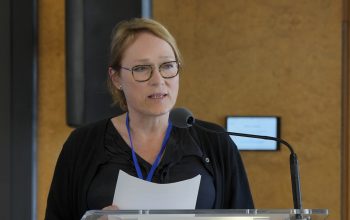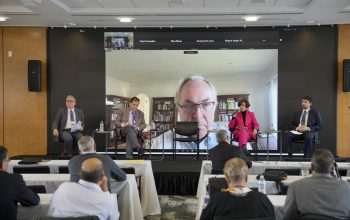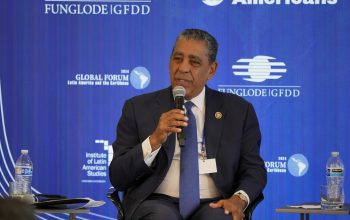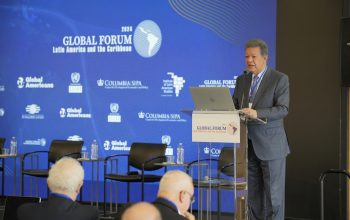news
“Bosch, the April Revolution, and the Johnson Doctrine”, an article by Dr. Leonel Fernández
April 27, 2015
Exactly half a century ago, on April 28, 1965, U.S. president Lyndon B. Johnson ordered the so-called Operation Power Pack, which consisted of a military intervention by the United States in the Dominican Republic, in breach of our sovereignty, independence, and national dignity.
With 41 ships initially deployed to blockade the island, the occupation began with the territorial presence of members of the United States Marine Corp, who were joined by most of
the U.S. Army’s 82nd Airborne Division for a total of 42,000 soldiers under the command of General Bruce Palmer.
According to documents declassified by the U.S. government, General Earle Wheeler, Chairman of the Joint Chiefs of Staff, relayed to General Palmer the following instructions, which serve as a guide in establishing the difference between appearances and reality. It read:
“Your announced mission is to save US lives. Your
unannounced mission is to prevent the Dominican Republic from going Communist. The President has stated that he will not allow another Cuba—you are to take all necessary measures to accomplish this mission. You will be given sufficient forces to do the job.”
This obviously contrasts with what president Johnson himself had said in a speech on May 2, 1965, eight days after the outbreak of the Revolution, when he sustained that the pro-Bosch revolt “began
as a popular democratic revolution, committed to democracy and social justice.”
Nearly identical terms had been used by Adlai Stevenson, U.S. ambassador to the United Nations, who held that his country’s government had “never” deemed Bosch’s political party “extremist.”
If in the words of president Johnson the April Revolution of 1965 had its roots in a popular democratic revolution,
and in those of its U.N. representative Bosch’s party was not extremist, why then order a military occupation to keep the Dominican Republic from turning into another Cuba?
The Johnson Doctrine
The answer lies in the application of the so-called Johnson Doctrine, part of the policies of the Cold War, which arose after World War II as a result of the rivalry between the two global superpowers of the era: the United States and the
Soviet Union.
According to that policy, the United States needed to create a wall of containment against the advance of Communism on an international scale. Otherwise a domino effect would occur, in which countries would topple one after another into the Communist camp, thereby generating a grave threat to the survival of the capitalist bloc.
These were the terms that framed Fidel Castro’s Cuban Revolution. At first it was seen as a revolt to
topple a dictatorship: that of Fulgencio Batista. Then, as an uprising of a radical nationalist movement that affected U.S. interests through the expropriation of firms and investments; and finally, after the failure of the Bay of Pigs invasion, as the revolution of a socialist country allied with the United States’ archrival, the Soviet Union.
Cuba thereby became Latin America’s benchmark of exactly what U.S. policy sought to avoid in the region. For
that reason, as an answer to the Cuban Revolution, John F. Kennedy created the Alliance for Progress, which sought to promote reforms to avoid revolution.
It’s said that president Kennedy himself told John Bartlow Martin, upon naming him ambassador to our country after the death of Trujillo, that U.S. policy toward the Dominican Republic, as in the rest of Latin America, had to consider three possible options.
The first would be that of the
establishment of a democratic regime; the second, a Trujillo-type government; and the third, a Castro- and Cuban Revolution-style system. Kennedy’s conclusion: Aspire to the first, without discarding the second, to avoid the third.
And it’s precisely within this scheme that the Johnson Doctrine fits, as, besides extending the Truman, Eisenhower, and Kennedy Doctrines, it proposed that a revolution in any country in the Western Hemisphere would not be
considered a local matter when “the object is the establishment of a Communist dictatorship.”
The idea that the April Revolution of 1965, whose aim was to return Juan Bosch to power and reestablish the Constitution of 1963, was Communist had been fed by cables sent from the U.S. embassy in the country and reports from the CIA and the Military Assistance Advisory Group (MAAG) to their superiors in Washington.
These reports ended up
having an important influence when it came to making decisions, as is seen, for instance, in the transcript of a phone conversation between president Johnson and his personal advisor Abe Fortas, in which the U.S. head of state said:
“Our CIA says this is a completely led, operated, dominated—they””ve got men on the inside of it; it””s a Castro operation. It started out as a Bosch operation but he””s been moved completely out of the picture. They shoved them out
and completely took over.”
In another note taken by Jack Valenti, Special Assistant to the President, on April 30, 1965, president Johnson is mentioned as saying:
“I am not willing to let this island go to Castro … How can we send troops 10,000 miles away and let Castro take over right under our nose. Let’s just analyze—we have resisted Communists all over the world: Vietnam, Lebanon, and Greece. What are we doing under our
doorstep. We know the rebel leaders are Communist.”
It was the conviction that the April Revolution had begun as a popular democratic revolution, but ended up being directed by Communists that led Johnson to erroneously decide to order Operation Power Pack and militarily occupy the Dominican Republic.
Bosch and Communism
But while during the period of the April Revolution of 1965 a distinction was made between
Bosch as leader of a popular democratic revolution and the parties of the left, what’s true is that during the very electoral campaign that would lead him to power in 1962, he had had to deal with the stigma of being a Communist, or at least of being very flexible and permissive toward Communists.
This began with an accusation from Father Láutico García, according to which the proof of Bosch’s Communist leanings were found in an article he had
published affirming that Lenin, leader of the Russian Revolution, had been a paradigm of governance who knew how to lead.
In a memorable televised polemic, Father García rescinded his accusation, and the lauded Dominican writer and politician, author of La Mañosa, proceeded to resoundingly win the elections.
Nonetheless, the damage was done. The accusations never ceased. Bosch was pressured to persecute, like Rómulo Betancourt in
Venezuela, any adherents of Marxist-Leninist ideas. He never did, and this provoked his opponents to continue sowing doubts, intrigue, and discord.
In truth, Bosch was fundamentally a democrat and social reformer—a man with a strong sense of dignity and independence. He suggested the elaboration of a Constitution that, in addition to the tradition liberal aspects, covered social issues. He proposed an agrarian reform to limit latifundia. He threated to cancel sugar and
molasses contracts. He established restrictions on the property rights of foreigners. He proposed secular schooling and denounced the contract signed by the Council of State with Esso for an oil refinery.
All these measures—controversial but valid within the democratic context—generated enormous tensions and difficulties. The U.S. press, particular the journalists Hal Hendrix and Jules Dubois, unleashed a fierce campaign to stigmatize him as a Communist, a label that
reverberated throughout the national press. Some U.S. legislators did the same, among them congressman Armisted Selden and senator George Smathers, who from their seats in the Capitol in Washington launched incendiary attacks against the Dominican head of state.
Clearly, even before the outbreak of the April Revolution, the theme was how to avoid Communist control of the Dominican Republic. The most lucid minds in the corridors of power in the United States must have
harbored the conviction that the symbol of the 1965 Revolution was a man of proper democratic credentials. But around his figure then hovered great distrust and suspicion.
Nonetheless, half a century later his name, alongside those of Francisco Alberto Caamaño Deñó, Rafael Tomás Fernández Domínguez, and all those who risked their lives to defend our freedom, independence, and sovereignty, hold a place of honor in the hearts of the Dominican people.
Related links: http://leonelfernandez.com/articulos/bosch-la-revolucion-de-abril-y-la-doctrina-johnson/






